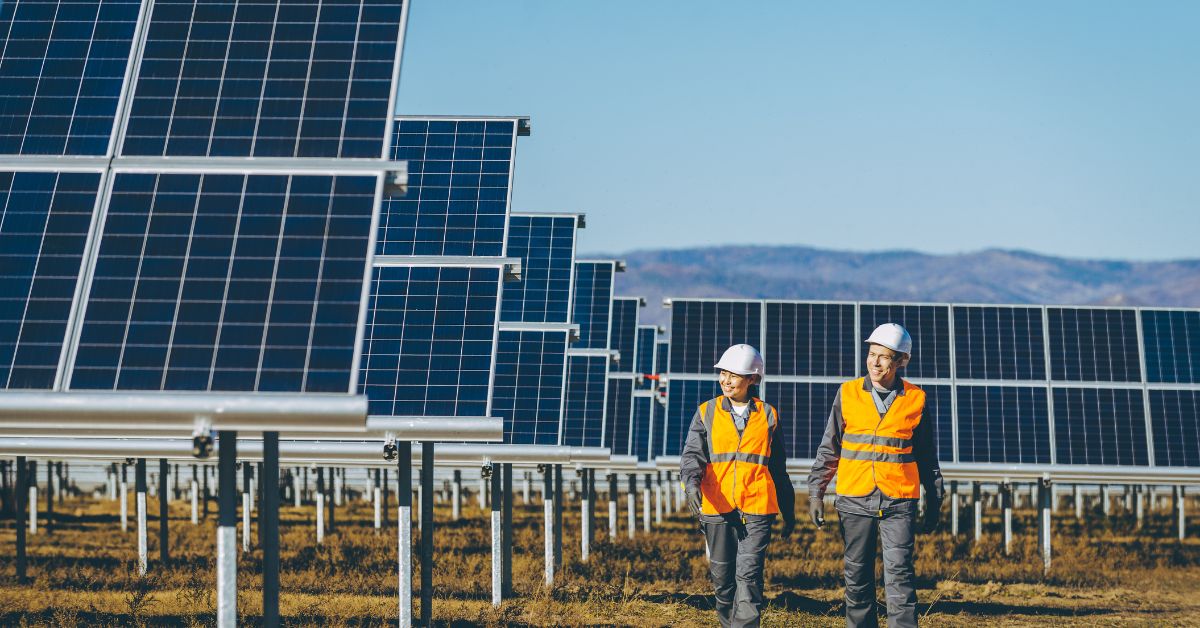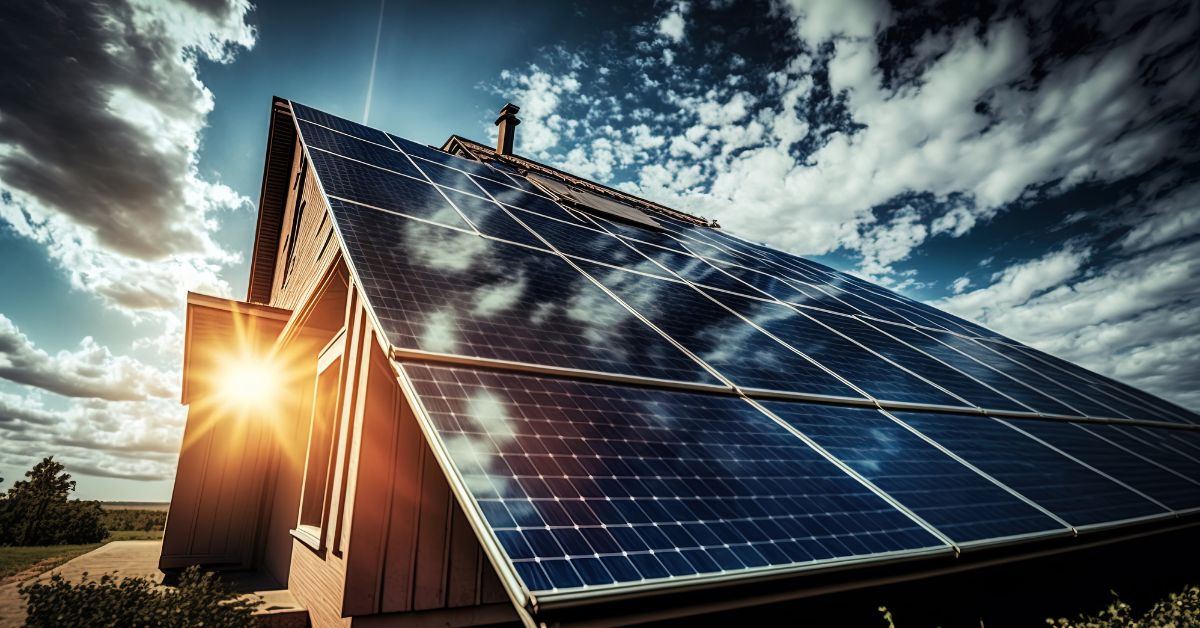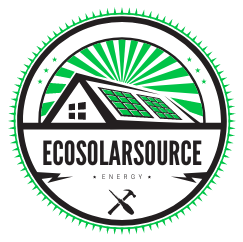Solar EPC Companies in India
Bright Future Solar is committed to promoting sustainable energy solutions across India. As a top Solar EPC Companies in India, they handle everything from project feasibility studies and financial modeling to system installation and after-sales service, ensuring seamless integration of solar power for residential, commercial, and utility-scale projects.
Solar EPC Companies in India: A Comprehensive Overview
India’s energy landscape has been undergoing a significant transformation in recent years, with a strong push towards renewable energy, particularly solar power. This shift is largely driven by the country’s commitment to sustainable development and reducing carbon emissions, as well as its abundant solar resources. The government’s ambitious target of achieving 280 GW of solar capacity by 2030 further underscores the critical role solar energy plays in India’s energy future.
One of the key players in this transformation is Solar EPC (Engineering, Procurement, and Construction) companies. These companies are crucial in the solar power ecosystem as they provide end-to-end solutions for solar power projects, including design, procurement of equipment, construction, and commissioning. In this blog post, we will delve into the role of Solar EPC companies in India, the top players in the market, the challenges they face, and the prospects for this industry.
The Role of Solar EPC Companies
Solar EPC companies are integral to the solar power value chain. They are responsible for the complete setup of solar power plants, whether rooftop or utility-scale projects. Their services include:
- Engineering and Design: This involves the initial planning and design of the solar power plant, including site evaluation, selection of solar modules, inverters, mounting structures, and other critical components. They use advanced software tools and simulations to optimize the design for maximum efficiency and output.
- Procurement: EPC companies handle the procurement of all necessary components and materials. This includes sourcing high-quality solar panels, inverters, cables, mounting structures, and other equipment. They negotiate with manufacturers and suppliers to ensure timely delivery and cost-effectiveness.
- Construction and Installation: Once the design is finalized and equipment procured, EPC companies undertake the construction of the solar power plant. This includes civil works, installation of solar modules, inverters, and other components, as well as the construction of necessary infrastructure such as mounting structures, cabling, and substations.
- Commissioning and Testing: After construction, EPC companies conduct rigorous testing and commissioning of the solar power plant to ensure it meets the desired performance standards and adheres to regulatory guidelines.
- Operations and Maintenance (O&M): Many Solar EPC companies also offer operations and maintenance services to ensure the long-term efficiency and productivity of the solar power plant. This includes regular inspections, cleaning of solar panels, and repair of any faulty components.
Importance of Solar EPC Companies in India’s Renewable Energy Sector
Solar EPC companies play a pivotal role in the growth of India’s renewable energy sector for several reasons:

- Expertise and Experience: These companies bring technical expertise and experience to the table, which is crucial for the successful implementation of solar projects. Their knowledge of local regulations, environmental considerations, and logistical challenges helps in mitigating risks and ensuring smooth project execution.
- End-to-End Solutions: By providing comprehensive solutions, Solar EPC companies streamline the entire project development process, from conceptualization to commissioning. This reduces the complexity and time required to set up a solar power plant.
- Cost Efficiency: By leveraging their relationships with suppliers and manufacturers, EPC companies can procure high-quality equipment at competitive prices, thereby reducing the overall cost of the project.
- Risk Management: Solar EPC companies are well-versed in managing various risks associated with solar power projects, such as technical challenges, regulatory compliance, and financial risks. They use advanced project management tools and methodologies to ensure projects are completed on time and within budget.
Top Solar EPC Companies in India
India is home to a diverse range of Solar EPC companies, from large multinational corporations to local players. Here are some of the top Solar EPC companies making a significant impact in India’s solar energy sector:
1. Tata Power Solar Systems Ltd.
Tata Power Solar, a subsidiary of Tata Power, is one of India’s leading solar EPC companies. With over three decades of experience, Tata Power Solar has installed over 5 GW of solar capacity across the country. The company offers a wide range of services, including solar EPC, solar rooftop solutions, and solar pumps. It has executed several large-scale solar projects for both commercial and industrial clients, as well as for government bodies.
Contact Details:
- Email: santoshc@tatapower.com
- Address: Corporate Center B, 34 Sant Tukaram Road, India, Maharashtra, Mumbai – 400 009
- Phone Number: (022) 6717 1000
2. Sterling and Wilson Solar Ltd.
Sterling and Wilson Solar is a global solar EPC company headquartered in Mumbai. It has a strong presence in over 25 countries, with more than 10 GW of solar power projects under its belt. The company specializes in large-scale solar EPC projects and has been recognized for its innovative solutions and high-quality standards. Sterling and Wilson Solar have been a key player in India’s solar growth story, having executed some of the largest solar power projects in the country.
Contact us:
- Address: Universal Majestic, Chembur, West Mumbai, Pin – 400043, MH, India
- Phone Number: +91 022-25485331
3. Adani Solar
Adani Solar is a subsidiary of Adani Group, a diversified business conglomerate with interests in energy, resources, logistics, agribusiness, real estate, financial services, and defense, among others. Adani Solar is involved in the entire value chain of solar energy, including the manufacturing of solar panels, development of solar parks, and providing EPC services. The company has a significant solar portfolio with several large-scale projects, including the world’s largest solar power plant in Kamuthi, Tamil Nadu, with a capacity of 648 MW.
Contact Details:
- Email: cs@adani.com
- Address: Adani Corporate House, SG – Highway, Shantigram, Ahmedabad – 382421, India, Gujarat, India
- Phone Number: +91-909900887
4. Mahindra Susten Pvt. Ltd.
The company offers comprehensive solar EPC services, including design, engineering, procurement, construction, and commissioning. Mahindra Susten has developed over 1.57 GW of solar projects across India and provides innovative solar solutions, such as floating solar power plants and solar carports.
Contact Details:
- Email: susten@mahindra.com
- Address: C/O Embassy, 6th Floor 247 Park, LBS Marg, Office No – 601, Tower B, Mumbai, Vikhroli West, India, Pin – 400083
5. L&T Solar (Larsen & Toubro)
Larsen & Toubro (L&T) is a well-known name in the engineering and construction sector, and its solar division, L&T Solar, is one of the leading solar EPC companies in India. L&T Solar offers end-to-end solutions for utility-scale solar power plants and has executed several high-profile projects across the country. The company is known for its expertise in handling large and complex projects, and its emphasis on quality and safety standards.
6. Azure Power
Azure Power is a leading independent solar power producer and Solar EPC company in India. The company develops, constructs, and operates solar power plants across India and offers EPC services to third-party clients. Azure Power has been a pioneer in the Indian solar sector, having set up one of the first utility-scale solar power projects in the country. It has a diversified portfolio of over 2 GW of solar capacity, catering to both commercial and government clients.
Contact Details:
- Email: susten@mahindra.com
- Address: 8th Floor, DLF Infinity, Cyber City, Gurugram-122002, India, Haryana
- Phone Number: +91 124-4155755
7. CleanMax Solar
CleanMax Solar is a prominent player in the Indian solar EPC market, focusing primarily on providing solar solutions to the commercial and industrial sectors. The company has a strong presence in India, the Middle East, and Southeast Asia, with over 500 MW of solar capacity installed. CleanMax Solar specializes in rooftop solar installations and has executed projects for several Fortune 500 companies and leading Indian businesses.
8. Vikram Solar
Vikram Solar is a globally recognized solar energy solutions provider, offering a comprehensive range of solar EPC services. The company is also a leading manufacturer of solar modules and has a strong presence in both the domestic and international markets. Vikram Solar has a robust portfolio of over 1 GW of solar EPC projects, ranging from utility-scale power plants to rooftop installations.
Contact Details:
- Email: sales@vikramsolar.com
- Address: Vikram Solar Limited ‘The Chambers’, Rajdanga Main Road, 8th Floor, Kolkata – 700107, WB, India
- Phone Number: 033 2442 729
9. Jakson Group
Jackson Group is a diversified energy and infrastructure company with a significant presence in the Indian solar EPC market. The company offers turnkey solar EPC solutions, including design, engineering, procurement, construction, and commissioning. Jakson Group has executed several solar power projects across India, including rooftop and ground-mounted installations.
Contact Details:
- Email: info@jakson.com
- Address: 626, DLF Tower-A, Jasola, India, New Delhi, Pin -110075
- Phone Number: 1800 103 2600
10. Hindustan Power Projects Pvt. Ltd.
Hindustan Power Projects is a leading player in the Indian power sector, with a strong focus on renewable energy. The company’s solar division, Hindustan Power, offers EPC services for utility-scale solar power plants and has developed over 1.5 GW of solar capacity in India. Hindustan Power is known for its expertise in executing large-scale solar projects and its commitment to sustainability.
Challenges of Solar EPC Companies in India
Solar EPC (Engineering, Procurement, and Construction) companies in India play a critical role in the country’s renewable energy sector. However, despite the significant opportunities in the solar industry, these companies face a variety of challenges that can impact their growth and operations. Here’s a detailed look at the key challenges faced by Solar EPC companies in India.

While the solar EPC sector in India has witnessed tremendous growth, it is not without its challenges. Some of the key challenges faced by Solar EPC companies in India include:
1. Regulatory and Policy Uncertainty
One of the biggest challenges for Solar EPC companies in India is the uncertainty in the regulatory and policy landscape. Although the Indian government has introduced several initiatives to promote solar energy, frequent changes in policies and regulations can create an unpredictable environment. For instance:
- Frequent Policy Changes: Changes in policies related to tariffs, subsidies, and duties can directly impact the financial viability of solar projects. The imposition of safeguard duties on imported solar panels, alterations in net metering policies, or abrupt changes in state-level incentives can disrupt project planning and execution.
- Inconsistent State Policies: India’s federal structure means that each state can have its own set of rules and regulations regarding solar projects. This inconsistency makes it challenging for EPC companies operating across multiple states, as they have to navigate a complex web of local laws and regulations.
- Delays in Approvals and Clearances: Obtaining the necessary permits and clearances from various governmental bodies can be a lengthy and cumbersome process. Delays in approvals can lead to project delays, increasing costs and reducing investor confidence.
2. Land Acquisition and Permitting Issues
Land acquisition is a critical challenge, particularly for large-scale utility solar projects. The problems associated with land acquisition include:
- High Costs and Scarcity of Land: In many parts of India, suitable land for solar projects is scarce and expensive. Solar projects require vast tracts of land, which can be hard to acquire, especially in densely populated or agriculturally important areas.
- Legal Disputes: Land in India is often subject to legal disputes over ownership and rights, which can lead to delays in project implementation.
- Environmental and Social Concerns: Solar projects can sometimes face opposition from local communities or environmental activists concerned about land use changes, habitat disruption, or other environmental impacts. Obtaining environmental clearances can add another layer of complexity to the permitting process.
3. Access to Financing
Financing is a significant barrier for many Solar EPC companies, particularly smaller players or those new to the market. Challenges include:
- High Initial Capital Costs: Solar projects require substantial upfront investment in land, equipment, and infrastructure. Securing the necessary funding can be difficult, especially for small and medium-sized EPC companies.
- Lack of Affordable Financing Options: Although the government has created agencies like the Indian Renewable Energy Development Agency (IREDA) to facilitate renewable energy financing, access to affordable loans and credit remains limited. High interest rates and stringent lending criteria can deter investment.
- Risk Perception: Banks and financial institutions may perceive solar projects as high-risk due to uncertainties in regulatory policies, land acquisition, and long-term power purchase agreements (PPAs). This risk perception can lead to higher interest rates or reluctance to finance solar projects.
4. Quality and Reliability of Equipment
The quality and reliability of solar equipment are crucial for the success of solar projects, but several issues complicate this:
- Availability of Substandard Equipment: The Indian market is flooded with low-cost, substandard solar modules and equipment, which can compromise the efficiency and lifespan of solar power plants. Ensuring the procurement of high-quality components is essential but often difficult.
- Dependence on Imports: A significant portion of solar panels and equipment used in India is imported, primarily from China. This dependency makes the supply chain vulnerable to international trade disruptions, currency fluctuations, and changes in import duties.
- Warranty and After-Sales Support: Ensuring warranty claims and after-sales support from international suppliers can be challenging. If equipment fails, it can lead to prolonged downtimes and increased costs due to replacement or repairs.
5. Technological Challenges
Solar EPC companies also face technological challenges that can affect the efficiency and cost-effectiveness of their projects:
- Rapid Technological Advancements: The solar industry is characterized by rapid technological advancements. Staying updated with the latest technology, such as advanced inverters, high-efficiency modules, and innovative mounting systems, is crucial for EPC companies to remain competitive. However, this also means frequent upgrades and potential obsolescence of existing equipment.
- Grid Integration and Stability: Integrating solar power into the grid poses technical challenges related to grid stability and reliability, especially in regions with weak grid infrastructure. Issues like voltage fluctuations and grid congestion can affect the performance of solar plants.
- Storage Solutions: As solar power is intermittent, developing efficient and cost-effective energy storage solutions is critical. However, battery storage technology is still evolving and remains relatively expensive, adding to the overall cost of solar projects.
6. Logistical Challenges
Solar projects, particularly large utility-scale ones, involve complex logistics that can pose several challenges:
- Transportation and Installation: Transporting large solar panels, inverters, and other equipment to remote locations can be challenging, especially in areas with poor infrastructure. Installation in rugged or inaccessible terrain adds to the logistical difficulties.
- Supply Chain Management: Managing the supply chain efficiently to ensure timely delivery of all components is crucial for maintaining project timelines. Any disruptions in the supply chain, such as delays in shipping or customs clearance, can lead to project delays and increased costs.
7. Human Resource Challenges
Finding and retaining skilled manpower is another challenge for Solar EPC companies:
- Skill Gap: The solar industry in India faces a significant skill gap, with a shortage of trained and experienced professionals in areas such as project management, engineering, and operations. This shortage can impact the quality and efficiency of solar projects.
- Labor Costs and Availability: In some regions, there may be a shortage of labor or higher labor costs, especially for skilled technicians and engineers. Retaining skilled staff is also a challenge due to competition from other sectors and regions.
8. Market Competition and Margins
The solar EPC market in India is highly competitive, with numerous players vying for a share of the growing market.
- Price Wars and Reduced Margins: Companies often engage in aggressive pricing strategies to win contracts, which can result in reduced profit margins. Sustained price wars can lead to financial strain, especially for smaller companies.
- Pressure on Innovation: While competition can drive innovation, it also forces companies to continually invest in new technologies and processes, which can be capital-intensive and risky.
9. Environmental, and Climatic Challenges
Solar projects are also subject to environmental and climatic factors that can impact their efficiency and lifespan:

- Dust and Pollution: In many parts of India, high levels of dust and pollution can reduce the efficiency of solar panels by blocking sunlight. Regular cleaning is required, which adds to the operational costs.
- Extreme Weather Conditions: Solar projects in regions prone to extreme weather conditions, such as cyclones, floods, or heatwaves, can face operational challenges and potential damage to equipment.
10. Currency Fluctuations
Since a significant amount of solar equipment is imported, fluctuations in currency exchange rates can impact project costs:
- Impact on Import Costs: A depreciating Indian rupee can increase the cost of imported solar modules and other equipment, affecting the overall project budget and financial planning.
- Hedging Risks: EPC companies must manage foreign exchange risks through hedging strategies, which can add to financial complexity and costs.
Conclusion
Solar EPC companies in India are pivotal to the country’s solar energy expansion. However, they face numerous challenges that can affect their operations, profitability, and growth. Addressing these challenges requires a collaborative approach involving policy reforms, financial innovation, technological advancement, and capacity building. As India continues to prioritize renewable energy, the role of Solar EPC companies will only grow in importance, making it essential to find solutions to these challenges for the sustainable growth of the solar sector.

